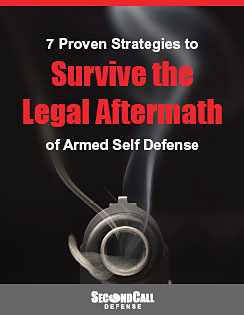Dramatic self defense shooting caught on 911 call
Most 911 calls reporting a self defense shooting happen after the incident. But here is one that records the entire drama.
This is from Botetourt County, VA in 2009. A drunken man goes on a rampage, trying to break into a house on a dark, rainy night.
You can hear the ravings of the disoriented man outside and the crash of patio door glass as he uses a piece of furniture to smash his way into the house.
Listen to all 3 parts of this bone-chilling 911 call.
911 Call – part 1
911 Call – part 2
911 Call – part 3
Some observations and questions to consider:
911 dispatchers
are trained to keep you on the phone. At one point in this call, you can hear the dispatcher say, “No matter what happens, just don’t hang the phone up.” Is this a good thing or a bad thing? The answer depends on what happens. While having an audio record of the incident could help you prove that you acted reasonably in a self defense shooting, it could just as easily hurt you. Notice that every word and every sound is forever captured.
Dispatchers can give questionable instructions. One example is the dispatcher asking the husband to put his gun down even though neither he nor his wife know for sure if the drunk man is still a threat. The following text is from WSLS10.
Dispatcher: “What happened?”
Wife: “He just came through and my husband shot him and he’s still moving.. Oh Lord”
Dispatcher to someone: “The husband shot him”
Dispatcher: “Where did he shoot him?”
Wife: “I don’t know.. I don’t know!”
Dispatcher: “Where is your husband?”
Wife: “He’s standing here in the kitchen to make sure he doesn’t come in”
Dispatcher: “ok.. I want you to tell your husband to put the gun down”
Wife : “what if he comes in to try and attack us?”
Even in her panic, the wife knows instinctively this may not be a good idea. The reasoning for the instruction? The dispatcher says, “Ma’am if he shot him he is not going to get up.. tell your husband to put the gun down please.”
Obviously, the dispatcher is thinking about the safety of the responding officers. However, given that no one knew the true condition of the intruder at that moment, think how tragic it would have been if the man had just enough fight left in him to charge through the door to confront an unarmed homeowner. Do you follow a dispatcher’s instructions? Or do you have to assess the situation yourself?
Bullets don’t instantly kill. In this case, two shots appear to have driven the man out of the house and caused him to collapse on the back patio. However, he was not immediately killed. Instant death happens only in the movies. You can hear the wife telling the dispatcher that the man is groaning outside in the dark. Was he still a threat?
The moment of attack is sudden and brutal. In this particular incident, the homeowners had plenty of time to mentally and physically prepare for the drunken man to break into their home. But when the door shatters and the husband shoots his gun, it’s all over in a flash. A decision to shoot must be made in a fraction of a second. And there are no do-overs. Imagine how much more chaotic it would have been if the intruder had broken down the door immediately!
It takes police a long time to respond. It’s difficult to know exactly when police arrived at the scene, but it may have been more than 9 minutes. Then more time elapses before they are able to secure the scene. It’s just one more example of the old saying that when seconds count, police are minutes away. The takeaway is that you are almost certainly going to be responsible for your own protection when your life is threatened. And that includes dealing both with the physical threat and the potential legal entanglements of the decisions you make.
“

